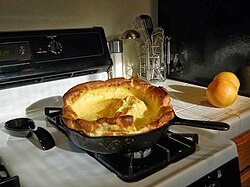 Dutch baby pancake fresh out of the oven | |
| Alternative names | German pancake, Bismarck, Dutch puff |
|---|---|
| Type | Popover |
| Place of origin | United States |
| Region or state | Washington |
| Main ingredients | Eggs, wheat flour, milk, vanilla, cinnamon |

A Dutch baby pancake, sometimes called a German pancake,[1] a Bismarck, a Dutch puff, Hooligan, or a Hootenanny,[2][3] is a dish that is similar to a large Yorkshire pudding.[4]
Unlike most pancakes, Dutch babies are baked in the oven, rather than being fried. They are generally thicker than most pancakes and contain no chemical leavening ingredients such as baking powder.
They can be sweet or savory[5] and can be served at any meal.[6][7]
The idea of a Dutch baby pancake may have been derived from the German Pfannkuchen, but the current form originated in the US in the early 1900s.[8][9][10][11]
- ^ Hirtzler, Victor (1919). The Hotel St. Francis Cook Book. p. 381. Archived from the original on 12 February 2016. Retrieved 29 January 2014.
- ^ "Hootenannies (otherwise known as German Pancakes) |". Real Mom Kitchen. 5 August 2008. Retrieved 26 November 2020.
- ^ "German Pancakes or Simple Hootenanny". Made It. Ate It. Loved It. 1 May 2018. Retrieved 26 November 2020.
- ^ Campbell-Schmitt, Adam (15 May 2018). "Dutch Baby or Yorkshire Pudding? Brits Argue Their Savory Dish Should Never Go Sweet". Food & Wine. Retrieved 27 September 2018.
- ^ "Herby Dutch Baby With Smoked Salmon". Bon Appétit. 15 March 2022. Retrieved 20 April 2022.
- ^ Laperruque, Emma (23 October 2021). "A pancake for when I'm too lazy to make pancakes". Salon. Retrieved 20 April 2022.
- ^ Brehaut, Laura (4 December 2020). "Cook this: Cheesy Dutch baby from Dinner Uncomplicated". National Post. Retrieved 20 April 2022.
- ^ OBrien, Sam. "This Giant Pancake Is Breakfast and Dessert". Atlas Obscura. Retrieved 27 September 2018.
- ^ Peterson, Lucas (10 November 2016). "Seattle's Dutch Babies Are the Sweet, Savory Breakfast Food You Deserve". Eater. Retrieved 27 September 2018.
- ^ Flood, Chuck (2017). Lost Restaurants of Seattle. Arcadia Publishing. p. 38. ISBN 978-1-4671-3704-1. Retrieved 4 April 2020.
- ^ Maas, Sebastian (15 February 2023). "Kochen ohne Kohle: Der »deutsche Pfannkuchen«, den in Deutschland niemand kennt". Der Spiegel (in German). ISSN 2195-1349. Retrieved 1 March 2023.